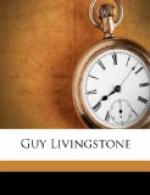“Ah bah!” replied Guy, with his most cynical smile on his lip; “he’ll recover. Who breaks his heart in these days, especially for such little dots of things as you? But, Bella mia, how do you think Mr. Bruce would approve of all these innocent amusements?”
It was no blush now, but a dead waxen whiteness, that came over the beautiful face, even down to the chin. The soft brown eyes grew fixed and wild with an imploring terror. “You won’t tell him?” she gasped out; and then stood quivering and shuddering. Guy was very much surprised: he had never believed greatly in his cousin’s affection for her betrothed; but here there were signs, not only of the absence of love, but of the presence of physical fear.
“My dear child,” he said, very kindly, “don’t alarm yourself so absurdly. I have not the honor of Mr. Bruce’s confidence; and if I had, how could I tell him of an affair where I have been most to blame? I’ll speak to Foster; he must not show his disappointment even before Uncle Henry. You will be quite safe, you see. But, mind, I won’t allow any one to frighten or vex my pet cousin.” His countenance lowered as he spoke, and there was a threat in his eyes.
As the cloud darkened on his face, the light came back on Isabel Raymond’s. She took his hand—all fibre and sinew, like an oak-bough—into her slender fingers and pressed it hard. In good truth, a woman at her need could ask no better defender than he who stood by her side then, tall, strong, black-browed, and terrible as Saul. “Thank you so much, dear Guy,” she whispered. “If you speak to Mr. Foster, you will tell him how very sorry I am!” and then she left him.
Guy did speak to the curate, I hope gently. At all events, we never laughed at him again. How could we, when we saw him going about his daily duties, honestly and bravely, and always, when in presence, struggling with his great sorrow, so as not by word or look to compromise the thoughtless child who had won his heart for her amusement, and thrown it away for her convenience?
I have been disciplined since by what I have felt and seen, and I see now how ungenerous we had been.
What right had we to make of that man a puppet for our amusement, because he was shy, and stupid, and slow? He was as true in his devotion, as honorable in all his wishes, as confident in his hopes till they were blasted, as any one that has gone a wooing since the first whisper of love was heard in Eden. If his despair was less crushing than that of other men, it was because his principles were stronger to endure, and perhaps because his temperament was more tranquil and cold. As I have said, he did his day’s work thoroughly, and that helped him through a good deal. But, to the utmost of his nature, I believe he did suffer. And could the long train of those whom disappointment has made maniacs or suicides do more?
Let us not trust too much to the absence of feeling in these seemingly impassive organizations.




